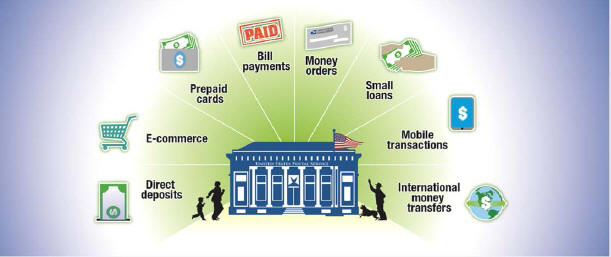Tagged: Universal Right to Vote by Mail Act of 2009
Post Haste: Why Reform of the US Postal Service is a Matter of Urgent National Concern
President Trump has been antagonistic to the United States Postal Service since the early days of his administration. In his plan for government reorganization, he called for the privatization of the post office. He has tweeted that the post office should charge Amazon more to deliver packages. Most recently, he has threatened to veto COVID-19 emergency funding if it contains direct funding for the post office.
 Ultimately, change is needed with regard to the postal service. However, that change needs to be an expansion in the role of the post office in public life rather than a diminution of its functions. Because the postal service has a universal service obligation to provide all aspects of service at an affordable price to all communities in the United States, it already represents a vital service to thousands of Americans who are not perceived as “profitable” to serve by private companies. Leveraging that power by expanding the role of the postal service can be a powerful boon to democracy and an agent of financial inclusion for underserved communities. Pending legislative proposals exist to address these concerns, and urgent action is needed. These proposed expansions to the role of the postal service require an additional legislative intervention to support its financial viability. To increase access, facilitate participation, and promote strong and healthy communities, three key legislative reforms to the post office are urgently needed.
Ultimately, change is needed with regard to the postal service. However, that change needs to be an expansion in the role of the post office in public life rather than a diminution of its functions. Because the postal service has a universal service obligation to provide all aspects of service at an affordable price to all communities in the United States, it already represents a vital service to thousands of Americans who are not perceived as “profitable” to serve by private companies. Leveraging that power by expanding the role of the postal service can be a powerful boon to democracy and an agent of financial inclusion for underserved communities. Pending legislative proposals exist to address these concerns, and urgent action is needed. These proposed expansions to the role of the postal service require an additional legislative intervention to support its financial viability. To increase access, facilitate participation, and promote strong and healthy communities, three key legislative reforms to the post office are urgently needed.
Postal Banking
The first potential legislative reform is the reintroduction of postal banking. Prior to 1967, the post office served an important role in providing basic financial services to thousands of Americans in rural and underbanked communities. Because the post office is a universal service, ensuring access to reliable mail service everywhere in the country, it was uniquely situated to ensure access to financial services like access to small loans, checking and savings accounts, and basic transactional services to communities not deemed profitable for traditional financial institutions to serve.
In 2017, 6.5% of households in the United States, or nearly 8.5 million households, were unbanked – meaning they had no formal bank account—and an additional 24.2 million were underbanked. These individuals are therefore forced to fringe or informal financial institutions, which often more costly to them because of high interest rates and lack the federal protection and oversight of traditional financial service providers. Re-establishing postal banking would create a formal institution to serve the basic financial needs of these communities, allowing them a greater degree of financial inclusion and economic participation without resorting to check cashers, payday lenders, or other informal actors.
Postal banking is a popular proposal with a historical precedent that can be reenacted to improve economic and financial inclusion for marginalized communities. Senator Gillibrand introduced legislation in 2018 to allow the postal service to conduct limited financial activities, but the bill was never heard in committee. Passing legislation similar to Senator Gillibrand’s bill would represent a key step toward improving access to financial services, and therefore financial inclusion and economic participation, for marginalized communities.
National Vote-By-Mail
The next key legislative reform to the postal service must be a federal move to facilitate national vote-by-mail. Election law is a largely a matter of state law, as states are empowered to set the particulars of elections within their jurisdiction subject only to minimal Constitutional requirements. States can and have taken the lead on expanding vote-by-mail; according to the National Council on State Legislatures, five states conduct all elections entirely by mail, and another three states allow counties to opt into vote-by-mail for all elections. In total, 21 states allow vote-by-mail elections in some capacity. However, the crisis of the novel coronavirus outbreak has underscored the need to take federal action as evidenced by the Supreme Court’s refusal to extend the deadline for absentee ballots in Wisconsin’s April election and the at least 36 resulting cases.
Senator Klobuchar introduced legislation that, among other things, would allow for expanded absentee vote-by-mail in every state during emergency conditions. While the legislation represents a good first step towards federal action on uniform access to vote-by-mail, it is limited to declared emergencies and therefore does not go far enough. In order to manifest the full benefits of vote-by-mail – most notably increased ease of and access to voting, therefore increasing turnout and civic participation – a more comprehensive bill is needed. The Universal Right to Vote by Mail Act of 2009, which would have made it easier to vote by mail by prohibiting states from imposing additional requirements on vote-by-mail eligibility, represents the kind of sweeping, permanent reform that is necessary to facilitate broad access to voting, and therefore civic and democratic participation, among all communities in a safe and healthy manner.
Removing the Pension Prefunding Requirement
For the benefits of these reforms to fully manifest, it is crucial that the post office is financially viable. This requires a final legislative reform – removing the pension prefunding requirement imposed on the postal service in the Postal Accountability and Enhancement Act of 2006 (PAEA).
While advocates of privatization claim that the post office is losing money, those claims fail to capture the full context of the legal predicament faced by the office. PAEA requires the postal service to prefund employee pensions until 2056, a requirement imposed on no other federal agency. Removing this requirement and allowing the post office to adopt the pay-as-you-go model used by the private sector and other federal agencies would result in over $5 billion in additional cash flow to the service. In order to support the other changes to the role of the postal service, this prefunding requirement must be lifted. This would allow the postal service to remain financially viable in its greater capacity without requiring service price increases.
These reforms have champions, including Senator Gillibrand who continues to speak out vociferously in support of the postal service and its potential to facilitate civic and economic participation and to improve access and inclusion for communities across the country. The trio of reforms described here would raise the profile of the postal service and increase its role in the lives of thousands of people across the country. With the reintroduction of postal banking and expansion of voting by mail, a financially bolstered United States Postal Service can support strong communities in a way that private industry has been unwilling or unable to do. Decades of financial exclusion and disinvestment in rural and low-income neighborhoods and the global crisis of the coronavirus have demonstrated that we, as a country, cannot wait to act. Reinvigorating the postal service and its role in society are of urgent national concern.
 Jordan Neubauer anticipates graduating from Boston University School of Law in May 2021.
Jordan Neubauer anticipates graduating from Boston University School of Law in May 2021.


